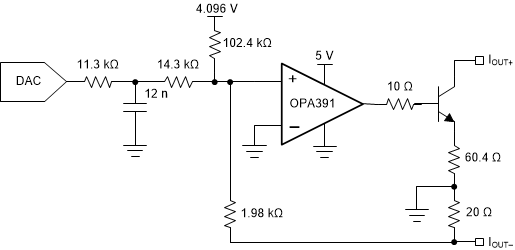SBOS925E December 2020 – October 2024 OPA2391 , OPA391 , OPA4391
PRODMIX
- 1
- 1 Features
- 2 Applications
- 3 Description
- 4 Pin Configuration and Functions
-
5 Specifications
- 5.1 Absolute Maximum Ratings
- 5.2 ESD Ratings
- 5.3 Recommended Operating Conditions
- 5.4 Thermal Information: OPA391
- 5.5 Thermal Information: OPA2391
- 5.6 Thermal Information: OPA4391
- 5.7 Electrical Characteristics: OPA391DCK and OPA2391YBJ
- 5.8 Electrical Characteristics: OPA2391DGK and OPA4391PW
- 5.9 Typical Characteristics
- 6 Detailed Description
- 7 Application and Implementation
- 8 Device and Documentation Support
- 9 Revision History
- 10Mechanical, Packaging, and Orderable Information
Package Options
Refer to the PDF data sheet for device specific package drawings
Mechanical Data (Package|Pins)
- PW|14
Thermal pad, mechanical data (Package|Pins)
Orderable Information
7.2.2 4-mA to 20-mA Loop Design
Factory automation systems commonly use the 4-mA to 20-mA (4-20 mA) communication protocol to enable process automation. In typical 2-wire, 4-mA to 20-mA loop applications, power to the remote transmitter is limited to less than 4 mA total consumption. As a result of the power limitations, low power consumption is essential. The OPAx391 solves many design challenges in 4-mA to 20-mA loop applications, where low power, high accuracy, and high bandwidth are required.
 Figure 7-4 4-20 mA
Loop Interface Schematic
Figure 7-4 4-20 mA
Loop Interface Schematic